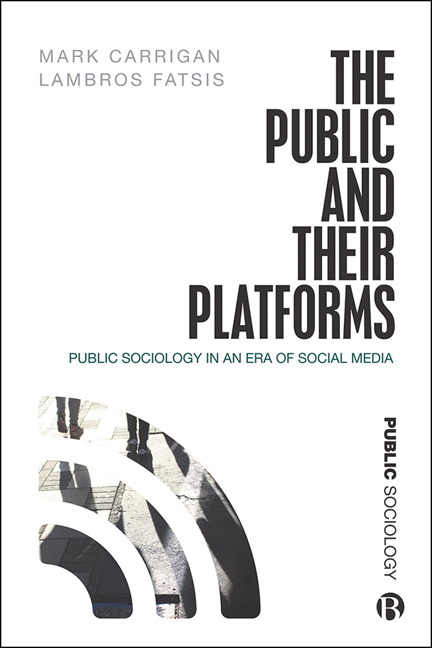Book contents
- Frontmatter
- Contents
- Acknowledgements
- Series Editors’ Preface
- Introduction
- 1 Defining ‘the Public’
- 2 The History of Platforms
- 3 Between Publics and Platforms
- 4 Sociology and its Platforms
- 5 The Past, Present and Future of Public Sociology
- 6 Making Sociology Public
- 7 Making Platforms Public
- 8 Assembling Public Sociology
- Notes
- References
- Index
7 - Making Platforms Public
- Frontmatter
- Contents
- Acknowledgements
- Series Editors’ Preface
- Introduction
- 1 Defining ‘the Public’
- 2 The History of Platforms
- 3 Between Publics and Platforms
- 4 Sociology and its Platforms
- 5 The Past, Present and Future of Public Sociology
- 6 Making Sociology Public
- 7 Making Platforms Public
- 8 Assembling Public Sociology
- Notes
- References
- Index
Summary
At the heart of our argument is a simple observation: there is an inherent asymmetry built into platforms. What makes them exciting at the level of social research, the real time data they unobtrusively generate as a by-product of user behaviour, can look rather sinister at the level of political economy (Mantello 2016, Wood and Monahan 2019). They are, as Marres (2018: 437) says, ‘an environment in two halves’. The front stage is a remarkably engaging place full of inducements, provocations and distraction while ‘a veritable army of social data scientists who monitor, measure, and seek to intervene in this behavioural theatre’ lurk behind the curtain (Marres 2018: 437). The users are known but the platform affords them little capacity to become knowing in turn (Kennedy and Moss 2015). This is what we have called, following Seymour (2019), ‘the social media machine’ and any account of digital public sociology needs to grapple with its implications in a systematic way. These are not tools we can pick up and put down at will but rather systems we can operate with and through that will simultaneously be exercising an influence over us, encouraging us to return more frequently and stay for longer when we do (Van Dijck and Poell 2018).
What Srnicek (2017) calls platform capitalism provides us with an exciting machinery for making public but it is one we are liable to be used by if we are not careful in our use of it. We offered the concepts of technological reflexivity and platform literacy to identify those characteristics necessary to thrive as public scholars under these conditions. Each of these involves leaving behind the assumptions of legacy scholarship concerning outputs, expertise and knowledge in order to embrace platforms in a way which leaves us prepared for their problems. What we describe in the next chapter as digital public sociology is an approach with its foundations in the space this opens up, taking advantage of the room we have to build on once legacy assumptions have been dispensed with. In entering this space, we begin to see how sociology transforms in changing conditions, with our modest conception being one contribution to what we hope is a broader debate about the socioeconomic shift that has been variably defined as data capitalism, digital capitalism, surveillance capitalism and platform capitalism.
- Type
- Chapter
- Information
- The Public and their PlatformsPublic Sociology in an Era of Social Media, pp. 149 - 172Publisher: Bristol University PressPrint publication year: 2021



